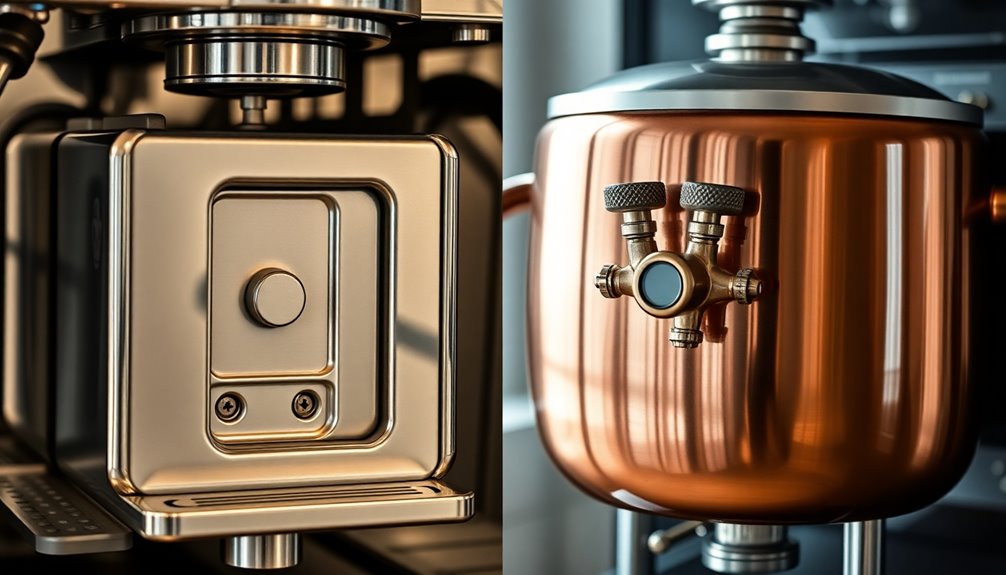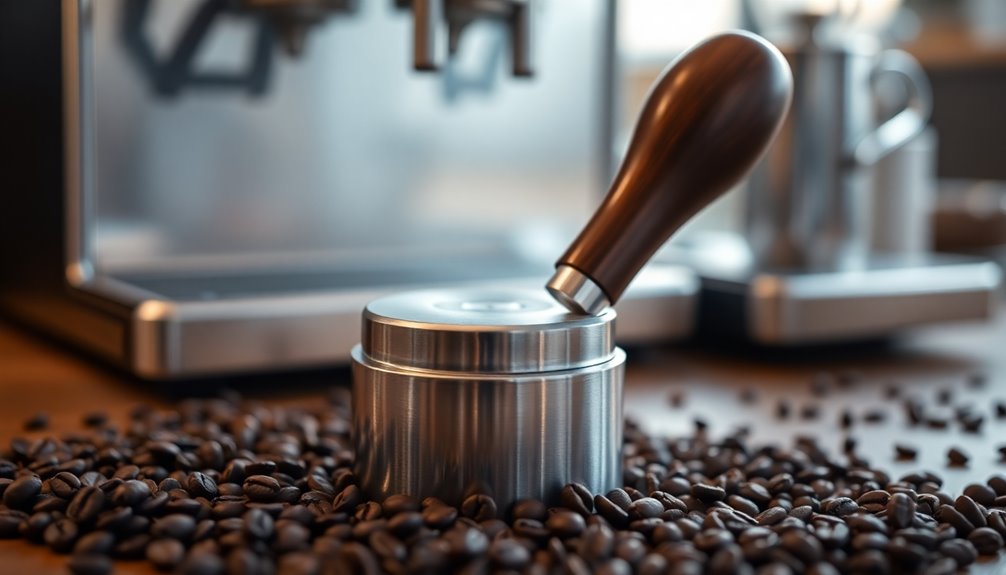When it comes to heating systems in espresso machines, thermoblock and boiler options have distinct advantages. Thermoblock heaters offer rapid heating and energy efficiency, brewing espresso in under a minute. However, they can struggle with consistency and pressure during multiple shots. On the other hand, boiler systems provide stable temperatures and allow for simultaneous brewing and steaming, increasing efficiency. Despite their higher cost and more maintenance, they are ideal for high-demand scenarios. Choosing the right system is essential for your coffee experience, and there's much more to take into account as you explore these options.
Key Takeaways
- Thermoblock systems heat water on demand, offering rapid brewing but may struggle with temperature consistency and pressure during multiple shots.
- Boiler systems provide stable heat and pressure, allowing simultaneous brewing and steaming, ideal for high-volume coffee environments.
- Single boiler systems require waiting between brewing and steaming, impacting efficiency and workflow in busy settings.
- Heat exchanger systems enable concurrent brewing and steaming but may face temperature instability, affecting drink quality.
- Dual boiler systems offer the best performance with consistent temperatures and pressure but come at a higher cost and complexity.
Understanding Thermoblock Heating
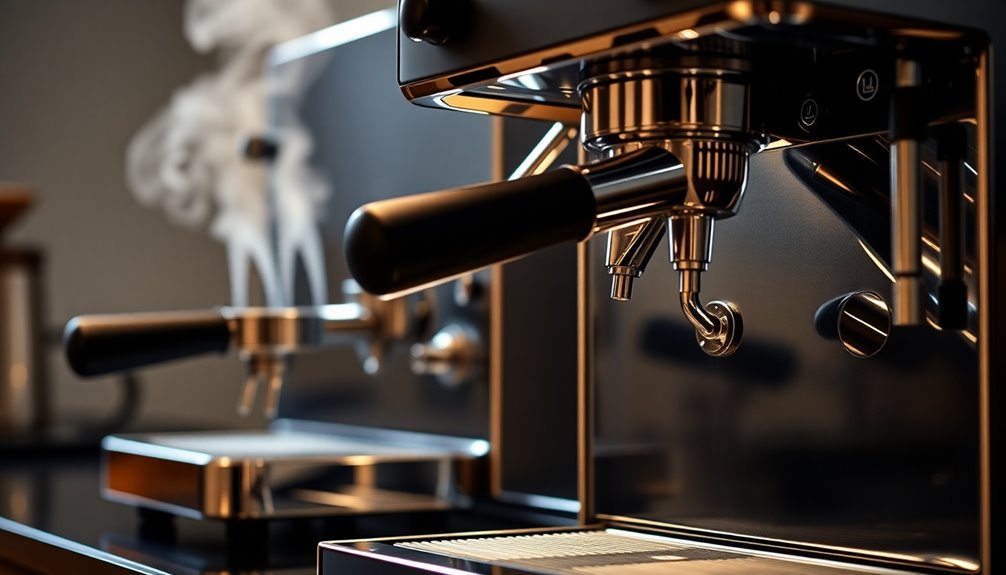
When you plunge into the world of espresso machines, understanding thermoblock heating becomes essential.
A thermoblock consists of a metal block, often aluminum, with channels for water to flow through. Surrounding these channels are heating elements that rapidly heat the water on demand. As water gets pumped in small bursts, it passes through the thermoblock, reaching the necessary temperature for brewing espresso in under a minute. This system can be a stand-alone or work alongside a boiler. Thermoblocks are popular in compact machines, making them accessible and energy-efficient. Additionally, the shorter heating time provided by thermoblocks allows for quicker brewing between shots, catering to those who enjoy multiple servings in a short period.
However, while they heat quickly, they may struggle with pressure and consistency during multiple shots, which is something to keep in mind when choosing your espresso machine.
Benefits of Thermoblock Systems
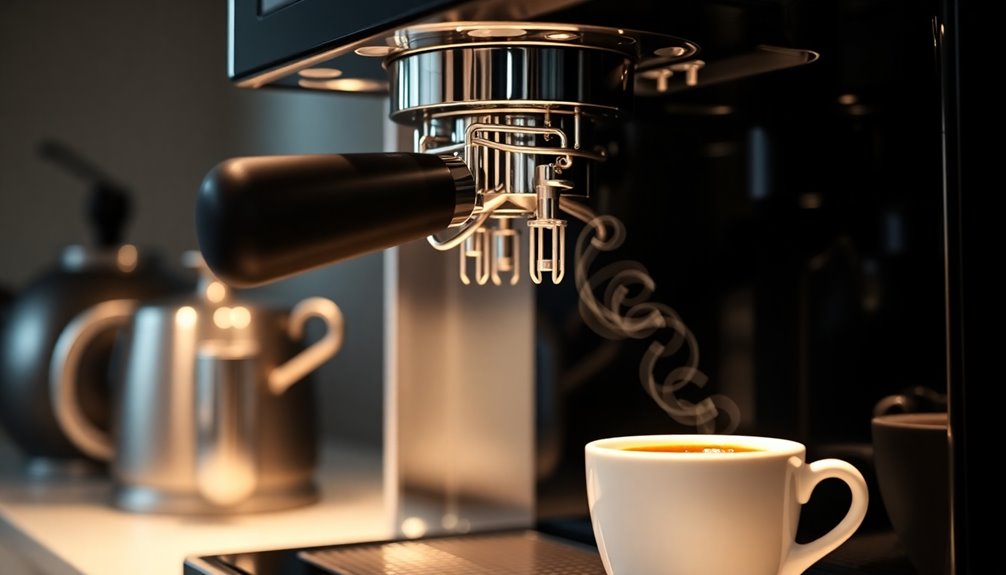
Thermoblock systems offer several advantages that make them a popular choice among espresso enthusiasts.
First, they heat water rapidly, allowing you to go from idle to brew temperatures in under a minute. This quick heating reduces waiting time between shots, perfect for making multiple drinks in succession.
Additionally, thermoblocks are energy-efficient, heating only the amount of water you need for each brew, which conserves energy and cuts down on power consumption. This feature is particularly beneficial because they heat only necessary water, enhancing their efficiency.
Their compact and lightweight design means they fit into smaller kitchens easily, making them ideal for those with limited counter space.
Finally, these systems are generally more affordable than other options, providing a cost-effective solution for coffee lovers looking for efficient brewing without breaking the bank.
Drawbacks of Thermoblock Systems
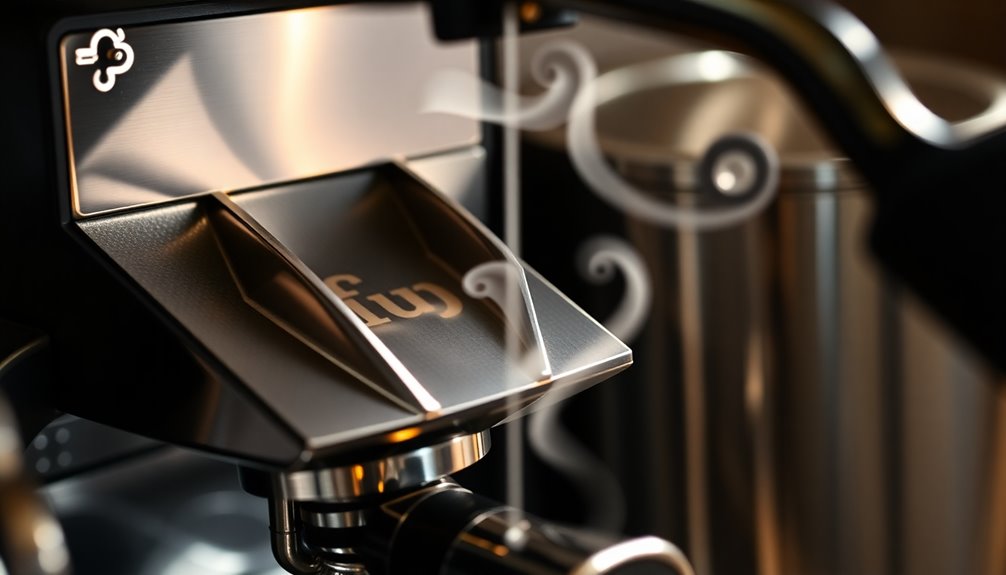
Although thermoblock systems are popular for their quick heating capabilities, they come with notable drawbacks that can affect your espresso experience.
One major issue is temperature consistency; the short duration water spends in the thermoblock can lead to fluctuating temperatures, resulting in inconsistent brewing. This lack of consistency is particularly pronounced when compared to systems with superior temperature accuracy that use boilers.
Additionally, thermoblocks can reduce pump pressure, impacting water flow and potentially dropping below the ideal 9 BAR pressure for espresso extraction.
On the steam front, these systems struggle to produce high-quality steam, often delivering moist steam at lower pressures, which undermines frothing capabilities.
Finally, single thermoblock machines have practical limitations, making it difficult to brew and steam simultaneously, and they may not hold up well in high-demand environments.
Overview of Boiler Systems
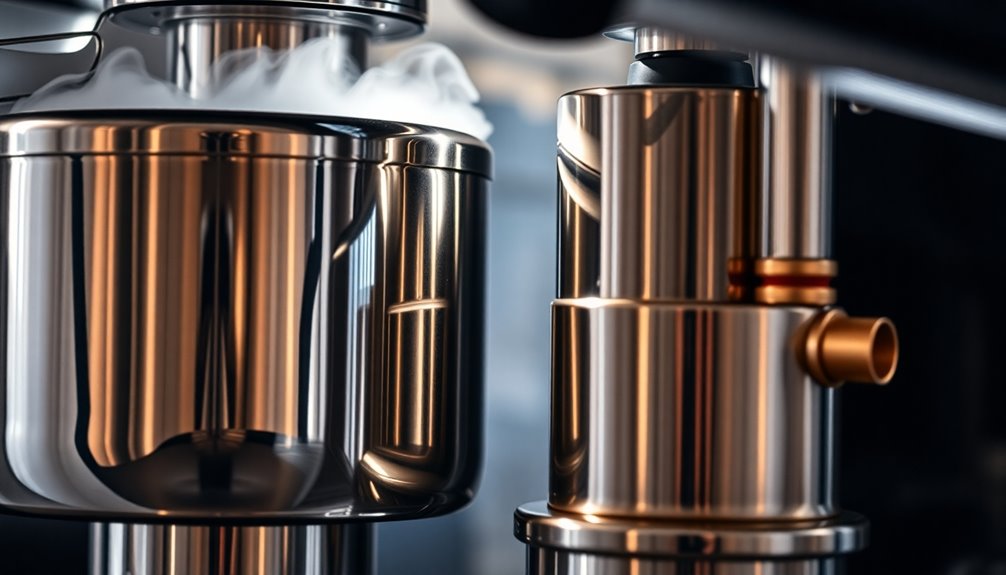
Boiler systems are essential for espresso machines, as they provide the necessary heat and pressure to brew coffee and create steam.
There are three main types: single boiler systems, heat exchanger systems, and dual boiler systems.
Single boiler systems use one boiler for both brewing and steaming, requiring you to wait between tasks.
Heat exchanger systems maintain the boiler at steaming temperature while heating brew water through a separate mechanism, allowing for simultaneous brewing and steaming. Heat exchanger technology utilizes a high-pressure boiler for brewing, enhancing the efficiency of these systems.
Dual boiler systems, with two dedicated boilers, enable you to brew and steam at the same time without any temperature adjustments.
Each type has its own components, like heating elements and steam valves, ensuring efficient operation and consistent coffee extraction.
Advantages of Boiler Systems
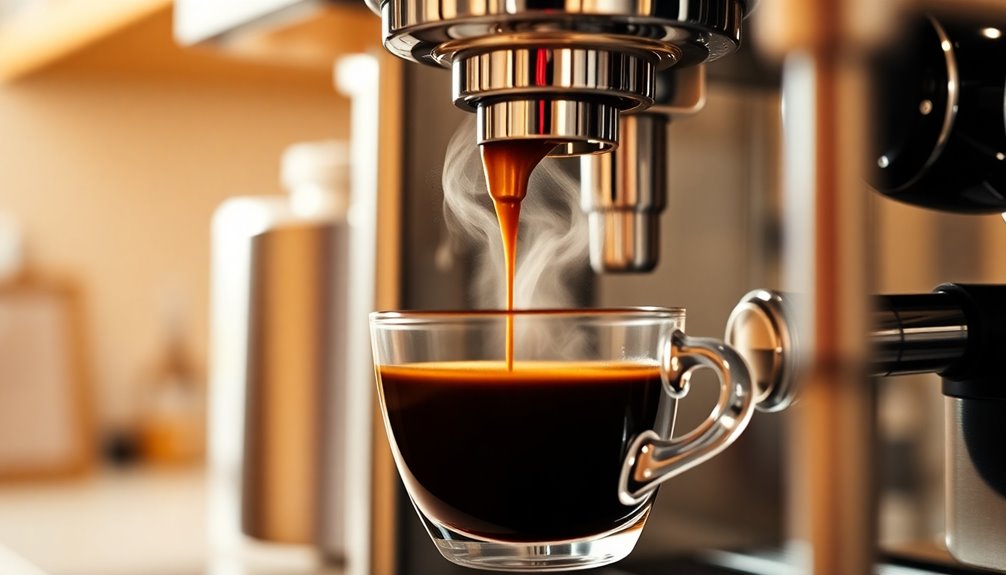
When you invest in a boiler system for your espresso machine, you'll experience significant advantages that enhance both efficiency and coffee quality.
You can pull coffee, foam milk, and produce hot water simultaneously, speeding up service during busy hours. This efficiency means baristas spend less time managing tasks and more time serving customers.
A boiler system maintains consistent brewing temperatures and pressure, ensuring each espresso shot tastes just right. This is further supported by the system's ability to ensure temperature stability during simultaneous operations.
With advanced features like PID-controlled thermostats and insulation, these machines optimize energy use and reduce overheating.
Although the initial cost might be higher, the long-term savings and reliable performance make it a smart choice for high-volume coffee shops, elevating your reputation for quality coffee. In comparison to k cups vs coffee pods, investing in a high-quality coffee machine can lead to significant cost savings over time. While k cups offer convenience, the cost per cup can add up quickly, especially in a high-volume coffee shop. By opting for a reliable coffee machine, you can also ensure that the flavor and quality of your coffee remain consistent, further enhancing your reputation among coffee enthusiasts.
Disadvantages of Boiler Systems
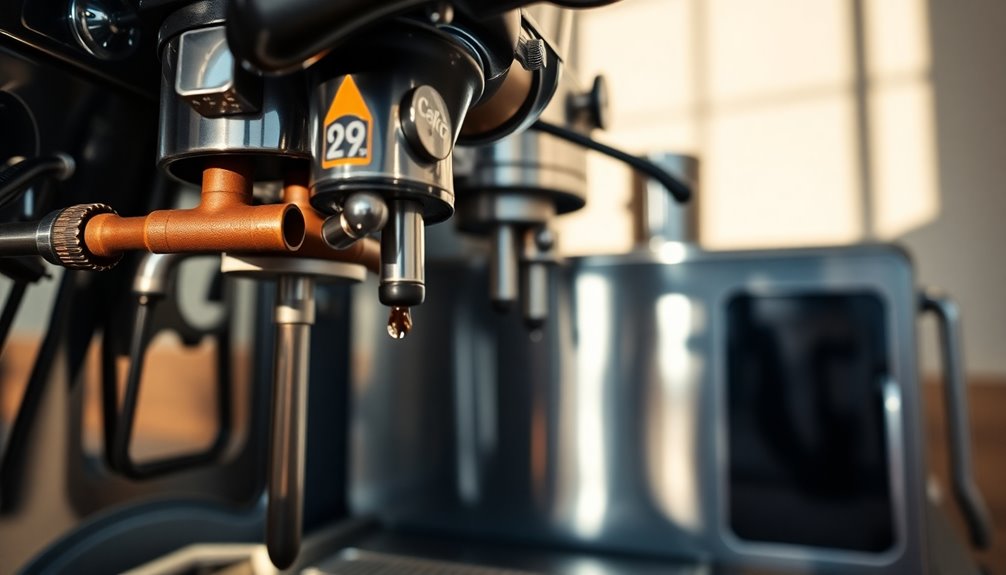
While boiler systems offer many benefits, they also come with notable disadvantages that can impact your coffee-making experience.
For single boiler systems, you'll struggle to control temperatures when switching between brewing and steaming, leading to long delays, especially when making multiple milk-based drinks. Brew water sits in the boiler, so it's not as fresh, which can affect taste. Additionally, the need for a cooling down period after steaming can further prolong the process of making espresso drinks.
Double boiler systems, while more versatile, are costly and complex, requiring more repairs and maintenance.
Heat exchanger systems may provide temperature instability, causing fluctuations during brewing.
Frequently Asked Questions
Which Heating System Is Better for Home Use, Thermoblock or Boiler?
When deciding which heating system is better for home use, think about your priorities.
If you value speed, energy efficiency, and a compact design, a thermoblock system might suit you well.
However, if you want consistent temperature control and the ability to brew and steam simultaneously, a boiler system is a better choice.
Ultimately, it depends on whether you prioritize convenience or espresso quality in your daily coffee experience.
How Do Thermoblocks and Boilers Affect Coffee Flavor?
When it comes to coffee flavor, thermoblocks and boilers play vital roles.
With thermoblocks, you might experience fluctuations in temperature, leading to inconsistent extraction and variable flavors.
On the other hand, boilers provide stable temperatures, ensuring consistent flavor profiles in every shot.
If you're after precise control and reliable flavors, you'll likely prefer a boiler.
However, if speed is your priority, thermoblocks can still serve you well, albeit with some flavor trade-offs.
Can I Convert a Thermoblock Machine to a Boiler System?
You can't typically convert a thermoblock machine to a boiler system.
The complexity involved, along with incompatible components and design limitations, makes it impractical.
You'd face high costs and need specialized technical expertise, which most users lack.
Instead of attempting such a conversion, consider purchasing a new machine that better fits your needs.
It'll save you time, effort, and potentially provide a better espresso experience in the long run.
What Maintenance Do Thermoblock and Boiler Systems Require?
When it comes to maintenance, both thermoblock and boiler systems need your attention.
For thermoblocks, clean the steam wand and portafilters daily, and descale every 3-6 months. Regularly check seals and gaskets.
With boilers, daily cleaning is vital, including backflushing and checking gaskets every three months. Descale every three months and perform deep cleaning every six months.
Keeping an eye on these tasks will guarantee peak performance and longevity for your espresso machine.
Are There Hybrid Machines That Use Both Heating Systems?
Yes, there are hybrid machines that use both heating systems.
These machines combine the fast heating capabilities of a thermoblock for steaming with a boiler for consistent brew temperatures.
You'll find that this setup allows you to steam milk and brew coffee simultaneously without compromising quality.
Plus, they often feature smart controls to manage energy use efficiently, making them a practical choice for both home and commercial settings.
Conclusion
In choosing between thermoblock and boiler heating systems for your espresso machine, you'll want to weigh the pros and cons of each. Thermoblocks offer quick heating and compact design, perfect for home use. However, they might struggle with temperature stability. On the other hand, boilers provide excellent temperature control but can be bulkier and take longer to heat. Ultimately, your choice should reflect your brewing needs and preferences. Happy brewing!
